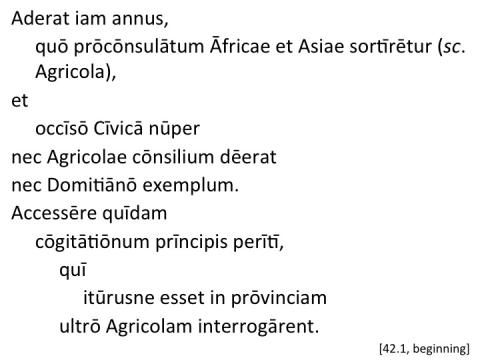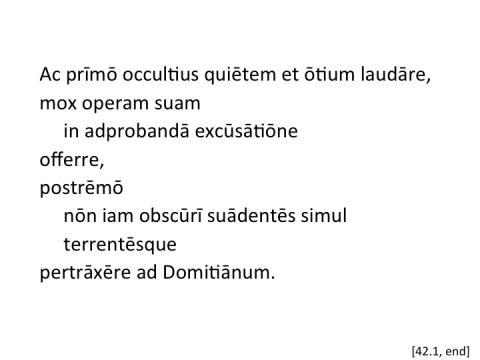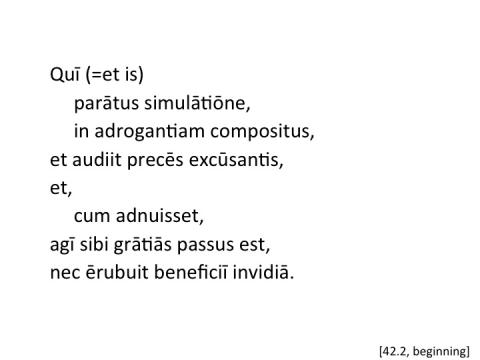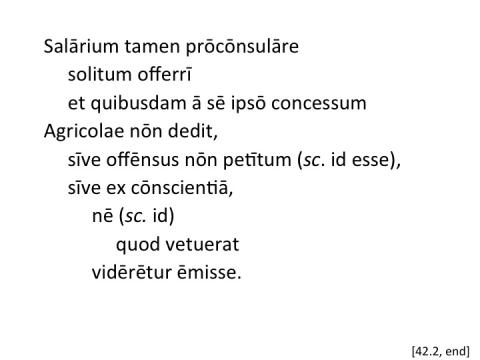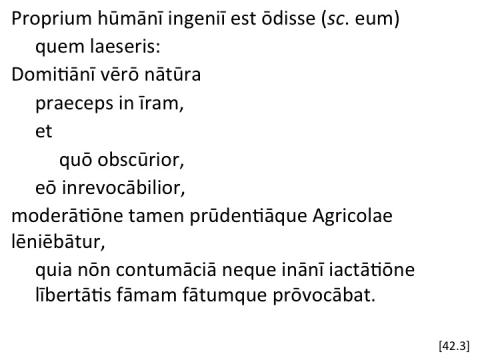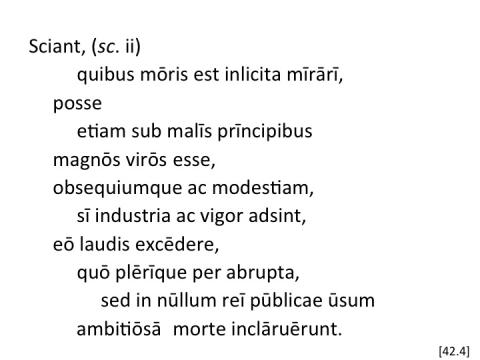Overview: Agricola becomes eligible for the proconsulate of Asia or Africa; he is intimidated into relinquishing his rights; his self-effacement assuages Domitian's resentment; such a course is more laudable than futile opposition to a tyrant; let his example be taken to heart! (Stuart) Agricola is not allowed to accept the proconsulship of Africa or Asia in his turn. His loyal submission gives no handle to Domitian's jealousy. (Pearce)
42.1
annus, etc.: Africa and Asia, the two most important senatorial provinces, were every year distributed, as a rule by lot, among the two senior ex-consuls. As the interval which was usually allowed to elapse between the consulship and this proconsulship seems to have fluctuated between five and thirteen years, it is impossible to determine exactly the date here alluded to. Agricola had been appointed consul in the fall of 77 CE, and Tacitus left Rome, undoubtedly in some official capacity, about 89/90 (see ch. 45.4). As it is intrinsically more probable that Domitian had thus honored Tacitus, before the expediency of rejecting the father-in-law had presented itself to him, than that he should have followed up this insult by promoting the son-in-law, Agricola's candidature must be dated a year or two after Tacitus's departure. (Gudeman)
sortīrētur: "he was to draw lots for." On the final subjunctive, see note ch. 34.3. (Gudeman) [A&G 531.2]
Cīvicā: C. Vettulenus Civica Cerialis, governor of Moesia in 82 CE; while he was holding office as proconsul of Asia, he was executed by Domitian on a charge of treason. (Stuart); Civica Cerealis had been put to death ... a year or two previously. (Pearce)
cōnsilium: i.e. Agricola, with the fate of Civica before his eyes, had a good reason for declining the dangerous office. (Gudeman)
exemplum: "precedent." On the medial position of the predicate, see Introd. p. xxvi #4. (Gudeman)
ultrō: "gratuitously," i.e. they were so eager to have Agricola withdraw that they could not wait till he had done so of his own accord, a probability foreshadowed by nec ... deerat, but actually asked him to announce his decision to them at once. (Gudeman)
occultius: "dissembling their motives." (Stuart); opposed to non iam obscuri below. Tacitus does not mean that their praise of a private life was obscure, but that their whole attitude was obscure, as they began by praising, &c. (Pearce)
quiētem et ōtium: on this synonymic collocation, see note ch. 6.3. (Gudeman)
in adprobandā excūsātiōne: "in justifying his withdrawal." (Stuart); adprobare means "'to win a person's approval of something"; in popular language, "to make it all right with some one." (Pearce)
nōn iam obscūrī: "now in no equivocal fashion." (Stuart); i.e. throwing off their mask and revealing their real design. (Gudeman) obscūrī: we should probably use an adverb here. (Pearce)
suādentēs simul terrentēsque: "by entreaty and threats alike." On the position of simul, see Introd. p. xxvi #4. (Gudeman)
pertrāxēre: actual physical violence is not implied. (Stuart); "dragged him right into the presence of." (Gudeman)
42.2
parātus simulātiōne: ablative of accompaniment.
(Pearce) [A&G 413a]; "well equipped with hypocrisy." ... Domitian pretended not to know what the object or the motive of Agricola's visit was. (Gudeman) simulātiōne: some editors emend to simulationi, "for pretense." (Damon)
in adrogantiam compositus: "assuming an air of haughtiness," i.e. condescendingly making a favour of something which he himself really wanted. (Pearce); sc. vultum, "assuming an expression of hauteur." (Gudeman)
agī sibi grātiās: this was part of the prudentia of Agricola, referred to below, by which he averted dangerous consequences. (Gudeman)
beneficiī invidiā: "the odiousness of the favour," which was really inspired by envy. (Pearce)
salārium ... prōcōnsulāre, etc.: the salary usually given to a proconsul, namely, of the provinces mentioned. (Gudeman) salārium: Augustus instituted salaries for provincial governors according to rank and thereby abolished one of the chief causes of extortion. (Stuart)
quibusdam ... concessum: it is not known who these were. (Gudeman)
offēnsus nōn petītum: sc. esse salarium. The accusative and infinitive with offensus is on the analogy of this construction with doleo, indignor, aegre fero, &c. (Pearce)
ex cōnscientiā: from his consciousness that people's suspicions in viewing it as a bribe would be correct, i.e. "owing to his uneasy conscience." (Pearce); the innuendo seems unjust, for Domitian's real motives and hostile attitude toward Agricola were made sufficiently transparent by the rejection of his candidature, together with the refusal to give him the salary granted to others under similar circumstances (Gudeman)
nē quod vetuerat ... emisse: a good instance of Tacitean over-conciseness. Domitian refused to grant the salary, but Agricola's refusal to accept it could only have been purchased after it had been granted. (Gudeman)
42.3
laeseris: subjunctive of the indefinite second person. (Pearce) [A&G 447.3]
vērō: "in fact"; the principle of human conduct just enunciated holds good naturally of such a character as Domitian. (Stuart) vērō: "now," introducing the application of the general maxim to a particular case. (Gudeman)
quō obscūrior, eō inrevocābilior: "the more implacable for being masked." (Pearce) inrevocābilior = implacabilior (its substitute elsewhere in Tacitus) is chiefly poetic and rare. (Gudeman)
inānī iactātiōne lībertātis: Tacitus regarded the principate as a political necessity, hence had no sympathy with the idealists and the irreconcilables who wished to restore the republic. (Stuart)
fāmam fātumque: the point is driven home by the alliteration, "a distinction which spelled doom." (Stuart) fāmam fātumque prōvocābat: "challenged distinction and death." The alliterative collocation is Vergilian. (Gudeman)
42.4
sciant, etc.: this famous passage, admirable alike in expression and in the sonorousness of its stately rhythm, not only sounds the very keynote of Agricola's political convictions and lifelong practice, but it also embodies the principles by which Tacitus himself was guided in his own career, as is evident from the numerous passages in which he inculcates the same opportunistic and temporizing doctrines. (Gudeman)
quibus, &c.: such as the Stoics.
(Pearce)
inlicita: behavior which was illegal because it defied the existing order of things in the state. (Stuart); "disloyalty." (Gudeman)
magnōs virōs esse ... inclāruērunt: a sonorous finish to weighty sentiments. (Gudeman)
obsequium: "conformity," the opposite of contumacia (Stuart)
industria ac vigor adsint: on the plural predicate with two abstract nouns joined by ac, see note ch. 4.6. (Gudeman)
eō laudis excēdere, quō, &c.: literally, "attain to that degree of praise to which" (quo), &c. Instead of ending with a verb of motion like excesserunt or pervenerunt, which would better suit quo per abrupta, Tacitus has inclaruerunt, which sums up the general meaning of the sentence but does not suit quo. However, the phrase quo ... inclarescere, though unusual, is borne out by such constructions in Greek. (Pearce) quō ... per abrupta: quo is a relative adverb; supply in thought some such expression as iter pergentes. The metaphor of a journey or an ascent was flitting through Tacitus's mind as he wrote. (Stuart) plērīque: "many," as so often in late Latin. (Pearce) plērīque = plurimi, the classical signification, but very rare in Tacitus. See note ch. 1.3. (Gudeman) per abrupta: sc. escendentes, i.e. the majority who lack the qualities just mentioned and injudiciously rebel against authority may, indeed, also reach great renown, but they do so over perilous paths, their effort culminating, without any ultimate benefit to their country, in a sensational death. Tacitus does not believe in political martyrdom, if it is not likely to bring about the realization of the objects fought for. (Gudeman)
ambitiōsā morte: "theatrical death." This caustic criticism is somewhat tempered by the pathetic and appreciative sketches which Tacitus gives elsewhere in his works of the deaths of political recalcitrants whose ends he here affects to believe were plays to the galleries rather than the results of lofty conviction. (Stuart) ambitiōsā: see note on 29.1. (Pearce)

